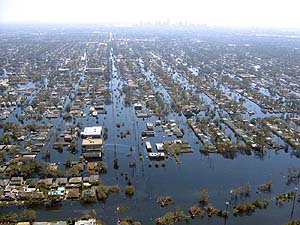 
|
|
About Mission 2010
FINAL PRESENTATIONS: This web site was developed by staff for the
Mission 2010 class. Class research is now complete and students are presenting their
final
recommendations
by streaming live video in a Final
Class Presentation on December 5th and in much more detailed fashion on a web
site.
Solving Complex Problems (12.000) is designed to provide students the opportunity to work as part of a team to propose solutions to a complex problem that requires an interdisciplinary approach. For the students of the Class of 2010, 12.000 will revolve around the issues associated with the long-term future of New Orleans in the aftermath of Hurricane Katrina.  On August 29, 2005 Hurricane Katrina devastated New Orleans and surrounding areas.
There were more than a thousand fatalities, billions of dollars in property losses,
and tens of thousands of people were stranded and/or lost their homes. Despite
a long history of flooding and dire predictions, all levels of government failed
to act in a timely and organized manner, which further exacerbated the problems.
In the past year, recovery efforts were slow and there was much discussion of
topics such as race, class, government response, and how the nation as a whole
should think about New Orleans and the Gulf Coast’s future. On August 29, 2005 Hurricane Katrina devastated New Orleans and surrounding areas.
There were more than a thousand fatalities, billions of dollars in property losses,
and tens of thousands of people were stranded and/or lost their homes. Despite
a long history of flooding and dire predictions, all levels of government failed
to act in a timely and organized manner, which further exacerbated the problems.
In the past year, recovery efforts were slow and there was much discussion of
topics such as race, class, government response, and how the nation as a whole
should think about New Orleans and the Gulf Coast’s future.
You will have the unique opportunity to make a difference by contributing to the national debate revolving around the reconstruction of New Orleans and the management of the Mississippi River and Gulf Coast. The destruction of New Orleans and many other parts of the Gulf  coast by Hurricane Katrina has posed many challenging
scientific and socio-economic questions. Was the disaster preventable? Are hurricanes
getting stronger? Have engineering controls of the Mississippi created more harm
than good? Why did flood protection fail? Should New Orleans be rebuilt and,
if so, how? Can the Gulf and New Orleans be better protected against future hurricanes?
What is the best long-term strategy for other coastal cities in the U.S. and
the rest of the world? Students of all backgrounds and interests are welcome
to work in teams toward the final design, which will be web cast at the end of
the semester in front of a panel of prestigious judges. coast by Hurricane Katrina has posed many challenging
scientific and socio-economic questions. Was the disaster preventable? Are hurricanes
getting stronger? Have engineering controls of the Mississippi created more harm
than good? Why did flood protection fail? Should New Orleans be rebuilt and,
if so, how? Can the Gulf and New Orleans be better protected against future hurricanes?
What is the best long-term strategy for other coastal cities in the U.S. and
the rest of the world? Students of all backgrounds and interests are welcome
to work in teams toward the final design, which will be web cast at the end of
the semester in front of a panel of prestigious judges.
Students in 12.000 will be responsible for developing and articulating a comprehensive plan for the future of New Orleans and should address questions that include, but are not limited to, the following.
|
 
|
